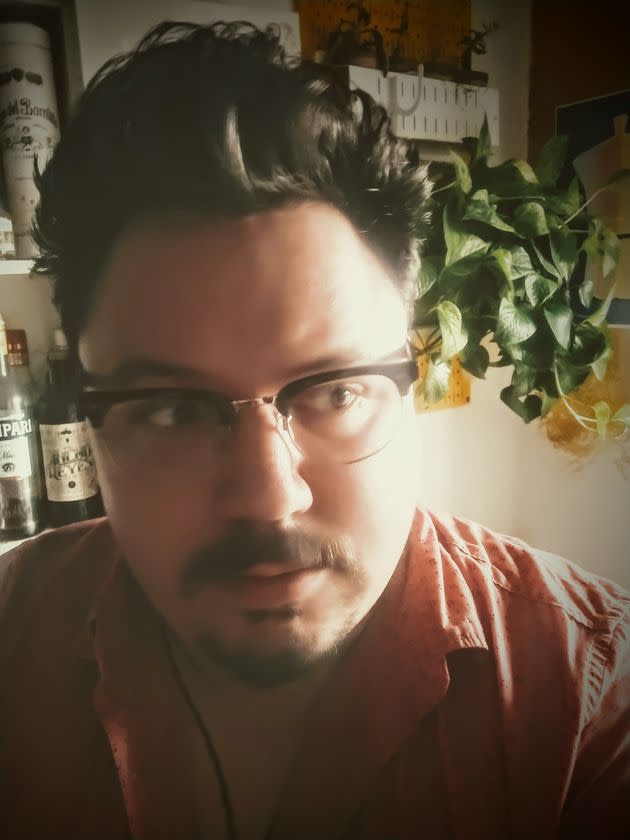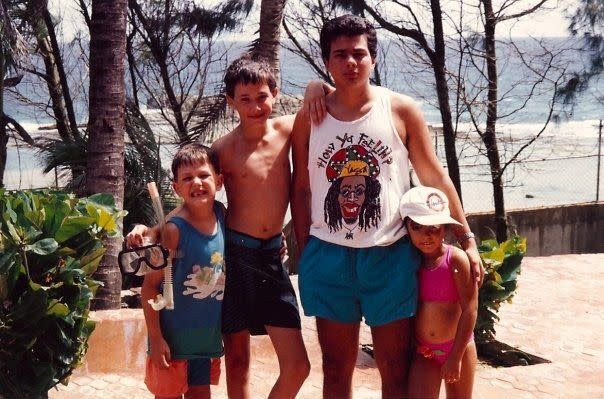I’ve Come To Accept Almost Everything About My Disability. But There’s One Part I Just Can’t Get Over.

Recently, my cousin got me a ticket to a comedy show entirely in Spanish. At the Hollywood Improv, Venezuelan-born comedian Angelo Colina and Netflix organized for five stand-ups to perform for a full room of Colombians, Mexicans, Venezuelans, Salvadorans, Dominicans and Puerto Ricans.
At first, I didn’t want to go.
I speak Spanish, kind of. My mother was born and raised in Puerto Rico. She moved to the States at 18, met and married my white father, and raised two boys in this country. She somehow managed to preserve Spanish in the household, imprinting the language deeply for both my brother and me. But the tongue is a muscle and it requires exercise, like any other. Without regular practice, my fluency fails me.
I was afraid regional accents and slang would inhibit my understanding, like an English learner being dropped in Deep Arkansas or South Boston. I nevertheless forced myself to attend. Once there, I howled with laughter. I was surprised to find I followed a good 90% of the humor.
I wish that’s how it ended: Bilingual boy loses Spanish, goes to funny ha-ha show, and reclaims his identity. Unfortunately, there’s a twist.
I’ve been half-this and half-that my whole life; it’s fitting, then, that I’m also half deaf. Nearly a decade ago, I lost 100% of the hearing in my right ear. It’s called idiopathic sudden sensorineural hearing loss, or ISSHL. I’m still not quite sure what sensorineural means, but idiopathic is defined as a condition that arises spontaneously, for which the cause is unknown.
What’s more, it’s accompanied by severe tinnitus, which I’ve learned to kind of tune out but still affects my brain’s ability to interpret sound. I haven’t known real silence for nine years.
In public places with many people talking at once, (which is just about any social situation ever), it’s difficult for me to hear. I can do one-on-one decently if I turn to “look” at people with my left ear. But at dinner parties, crowded bars, or even just walking down the street, unless the speaker is directly to my left, it all blends together.
Obviously, the loss severely impacted my life. I mourned the physiological damage, but was unprepared for how it would affect my cultural identity.
The first time I traveled to Puerto Rico after my disability struck is seared into my memory. My aunt picked me up from the airport in the evening, and took me to a group dinner at a fancy Italian bistro with her friends. There were about six women in a private room in the back. We were at one table, separated from the main room by large panels of glass, a material that reverberates and echoes in peculiar ways. Within 90 seconds of entering this luxury dungeon with terrible acoustics, I found I understood nothing.
I used to be charming in Spanish, maybe even a little witty. But if you want to be witty, you have to listen. And you can’t listen if you can’t hear.
I have to really focus when I’m speaking Spanish. Apart from the times I’ve lived in a Latin American country, my ear doesn’t receive the regular exposure necessary for passive understanding. Have you ever accidentally eavesdropped on a stranger in another conversation? Not me. At least not in Spanish.
But that night, no amount of effort would save me. With what little I could hear, understand and process, I lost my confidence, and the will to even participate. I felt like a 4-year-old, unable to take part in the adult discussion. I could have been working on a coloring book, for all I was able to participate. What’s more, I blamed myself. I was so miserable, I could barely mutter my goodbyes to the cadre of nice ladies on the sidewalk as we parted ways.
I felt, in that moment, that I’d lost my hearing all over again, along with a part of myself. A part of me that my parents had worked hard to instill in me, that I’d put work into maintaining.
Physically, I don’t look at all Hispanic, and my connection to my language was how I flew my cultural flag. I smile and greet the workers at the Hispanic markets when I need the good beans. Back where I grew up was a Salvadoran-owned pool hall where I always spoke up early and fluently, just to let them know I was “cool.” It was my way of expressing kinship. It just feels good to belong.
Polyglots will understand that a single speaker can have different personalities in different languages. My mother, a classic baby boomer, rarely is (purposefully) funny in English, although she has a silly, self-effacing streak, made more amiable by her accent. Yet, once she’s among family and the language shifts to Spanish, she’s witty, with a venomous comic timing that has left me in tears.
In Spanish, my mother is hilarious. In Spanish, now, I’m kind of an asshole.
Back at the Improv on Melrose, the show let out and the spectator portion of the evening was over. My cousin, Gaby, grew up with one of the comedians, and there was a healthy Puerto Rican diaspora that took over the front bar section. Everybody knew each other, and Gaby was eager to introduce me to her friends.
I went prepared to not be able to talk to anyone. In truth, I almost didn’t go at all, for fear of this exact moment. There was even a director there, a friend of Gaby’s, who released a big-time feature last year. As a writer, industry contacts like this are manna from heaven. Anyone in my position would have seized the opportunity to introduce themselves and offer to buy this guy a drink.

I chickened out. It wasn’t even that noisy in the room, but the stigma of my disability and its effects have ossified my cultural personality. I couldn’t bear stumbling through a conversation, asking everyone to repeat what they said three times. Or, what’s worse, giving the impression I never cared enough to practice my Spanish. I’d rather people assume that I’m shy or awkward than think I’m a lapsed Puerto Rican.
I clung to the walls, checking my phone for no reason at all. When my cousin invited me to join the remaining group for dinner, I was immediately transported back to that Italian bistro in Puerto Rico, with the glass walls and the shame. I declined.
It would have been easy to introduce myself to this potential professional contact, even if I didn’t join them for dinner. Instead, I outran my shame, catching my breath a few blocks later.
As I made my way home, thoughts continued to swirl about my future, which is becoming the product of a self-fulfilling prophecy. Medical advances in hearing are rare, and specialists have told me this affliction is likely to last my whole life.
In general, I seek out social interactions in which I’m paired with one or possibly two people. My friends are accommodating, always saving me a seat at the proper corner of the table. I’ve come to accept almost everything about my disability. Everything except this.
I’m OK with being a wallflower in a noisy, all-English environment. Ironically, it allows me to be more observant. And who really misses small talk? All my conversations are that much more intimate, because they’re close-up, because they’re exclusive. The Spanish is the one part I’m still angry and depressed about.
I’m thankful for the hearing I still have, although I’m anxious about the effects as I age. Hearing loss, and the social isolation it begets, have been linked to a decrease in cognitive function later in life. I’ve already had one cultural leg swept out from under me. In another 20 years, will I begin losing English the way I’m currently losing Spanish?
When you’re split between two cultures, it’s like trying to walk around with only one shoe. You hobble around, constantly off-balance, hoping that no barefoot or shoed people ask you for an explanation. For now, I’m still consumed with how other people see me, rather than how I feel about myself.
Had I gone to dinner or shook that director’s hand, in all likelihood no one would have noticed, or even cared, that my Spanish wasn’t equal to theirs. Culture is dynamic, even if for the moment, I feel stagnant. This time, I failed to affirm my identity, but there will be another comedy show. And even though it hasn’t yet, I assuage myself with the belief that acceptance will come.
Do you have a compelling personal story you’d like to see published on HuffPost? Find out what we’re looking for here and send us a pitch at pitch@huffpost.com.

